
Primula is a genus of herbaceous flowering plants in the family Primulaceae. They include the primrose, a familiar wildflower of banks and verges. Other common species are P. auricula (auricula), P. veris (cowslip), and P. elatior (oxlip). These species and many others are valued for their ornamental flowers. They have been extensively cultivated and hybridised. Primula are native to the temperate Northern Hemisphere, south into tropical mountains in Ethiopia, Indonesia, and New Guinea, and in temperate southern South America. Almost half of the known species are from the Himalayas.
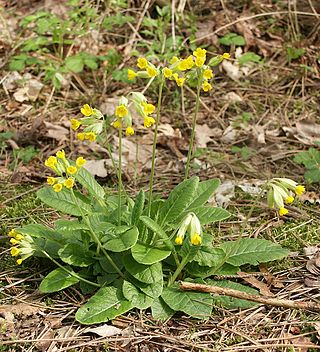
Primula veris, the cowslip, common cowslip, or cowslip primrose, is a herbaceous perennial flowering plant in the primrose family Primulaceae. The species is native throughout most of temperate Europe and western Asia, and although absent from more northerly areas including much of northwest Scotland, it reappears in northernmost Sutherland and Orkney and in Scandinavia. This species frequently hybridizes with other Primulas such as the common primrose Primula vulgaris to form false oxlip which is often confused with true oxlip, a much rarer plant.
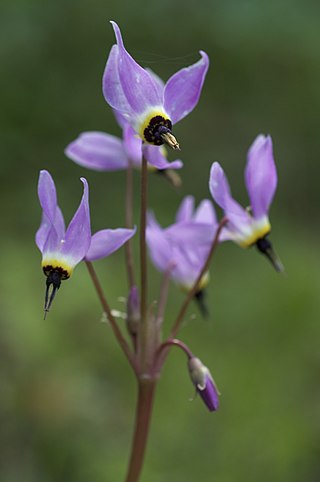
Primula hendersonii is a species of flowering plant in the family Primulaceae, native to western North America, from California north to southern British Columbia and Idaho. Common names include broad-leaved shooting star, Henderson's shooting star, mosquito bills, and sailor caps.

Primula vulgaris, the common primrose, is a species of flowering plant in the family Primulaceae, native to western and southern Europe, northwest Africa, and parts of southwest Asia. The common name is primrose, or occasionally common primrose or English primrose to distinguish it from other Primula species also called primroses. None of these are closely related to the evening primroses.

Anacamptis morio, the green-winged orchid or green-veined orchid, is a flowering plant of the orchid family, Orchidaceae. It usually has purple flowers, and is found in Europe and the Middle East.

Primula elatior, the oxlip, is a species of flowering plant in the family Primulaceae, native to nutrient-poor and calcium-rich damp woods and meadows throughout Europe, with northern borders in Denmark and southern parts of Sweden, eastwards to the Altai Mountains and on the Kola Peninsula in Russia, and westwards in the British Isles.

Leucojum aestivum, commonly called summer snowflake or Loddon lily, is a plant species widely cultivated as an ornamental. It is native to most of Europe from Spain and Ireland to Ukraine, with the exception of Scandinavia, Russia, Belarus and the Baltic countries. It is also considered native to Turkey, Iran and the Caucasus. It is naturalized in Denmark, South Australia, New South Wales, Nova Scotia and much of the eastern United States.

The flora of the U.S. Sierra Nevada alpine zone is characterized by small, low growing, cushion and mat forming plants that can survive the harsh conditions in the high-altitude alpine zone above the timber line. These flora often occur in alpine fell-fields. The Sierra Nevada alpine zone lacks a dominant plant species that characterizes it, so may or may not be called a vegetation type. But it is found above the subalpine forest, which is the highest in a succession of recognized vegetation types at increasing elevations.

Primula angustifolia, also known as alpine primrose, is a species of flowering plant in the family Primulaceae, native to the Rocky Mountains of the United States. It is commonly found in Colorado and New Mexico.
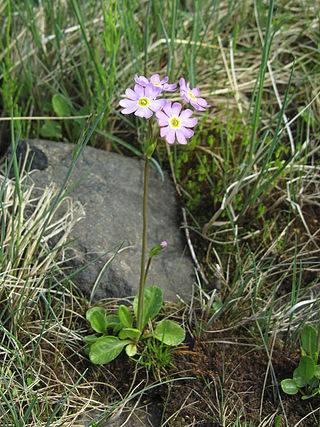
Primula nutans, also known as the sleepy primrose, is a species of flowering plant belonging to the family Primulaceae.
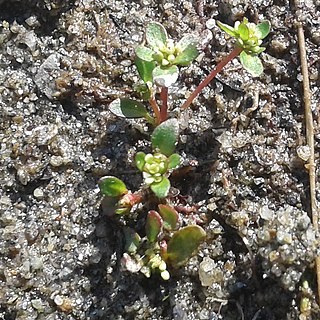
Koenigia islandica is a species of annual flowering plant in the buckwheat family, Polygonaceae and is the type species of the genus Koenigia. It is a very small plant and is found growing on wet gravel and scree in arctic tundra and alpine meadows.

Oenanthe silaifolia, narrow-leaved water-dropwort, is a flowering plant in the carrot family, which is native to Europe and adjacent parts of Asia and North Africa. It is an uncommon plant of water-meadows and wetlands.

Primula stricta, also known as the strict primrose, is a species of flowering plant in the family Primulaceae.
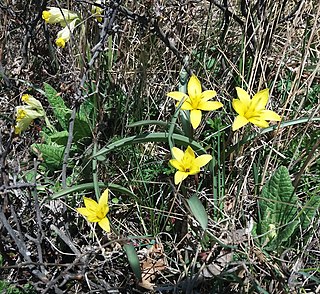
Tulipa uniflora is a flowering plant species belonging to the genus Tulipa, within the family Liliaceae.

Primula aureata is a species of flowering plant from the family Primulaceae.
Primula zhui is a species of flowering plant within the family Primulaceae. The species was named in honour of Professor Zhu Hua of the Xishuangbanna Tropical Botanical Garden. As of 2017 there were fewer than 50 individuals of the species recorded to exist, which lead to the IUCN to consider classifying it as a critically endangered species.
Primula heucherifolia is a species of flowering plant in the family Primulaceae.
Primula boveana, also known as the Sinai primrose, is a species of flowering plant within the family Primulaceae. The species was named in honour of botanist and plant collector Nicolas Bové.
Primula filipes is a species of flowering plant within the genus Primula and family Primulaceae.

Primula wollastonii, also known as Wollaston's primrose, is a species of flowering plant within the genus Primula and family Primulaceae. The species was first discovered and collected by A. F. Wollaston during an exhibition to Mount Everest in 1921. The plant would later be scientifically described by Scottish botanist Isaac Bayley Balfour, who named the species P.Wollastonii after a request from Wollaston who had first discovered it.


















